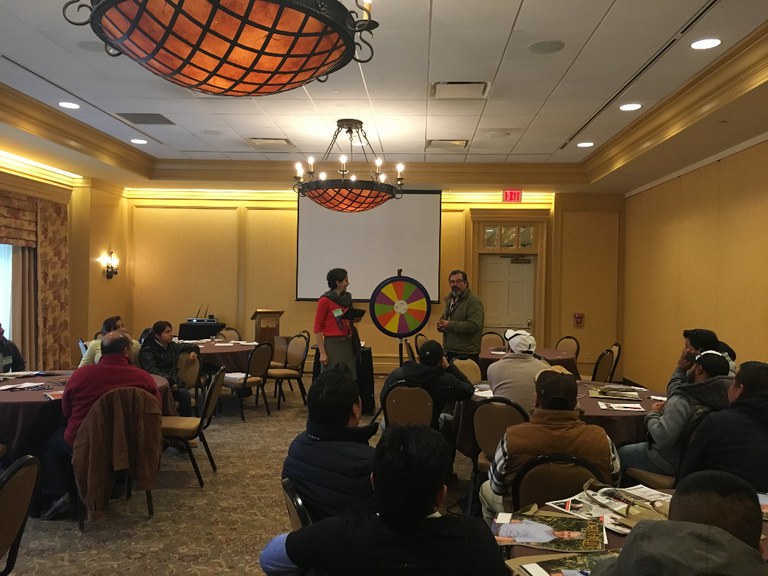On January 31, 2018 during the 9th annual Mid-Atlantic Fruit and Vegetable Convention (MAFVC) and Trade Show, a 5-hour long workshop was held for Spanish speaking growers and employees.
This was the ninth year for this bilingual programming, and attendance has grown from 20 to over 40, with four states--Pennsylvania, Maryland, New Jersey, and Virginia--represented. Although participation in this event required a registration fee, admission to other educational sessions and the trade show were included. The MAFVC also provided an excellent opportunity for networking and social connection, as it is a multi-state event.
The day began with a short icebreaker to allow everyone to mingle and get to know each other. This was followed by a presentation focused on the "Ecological Framework for Pest Management" by Beth Sastre, Virginia Cooperative Extension. Dr. Anamaria Gomez, an Independent Consultant, then gave a talk on "Vegetable Crop Establishment". Before the lunch break, Maria Gorgo-Gourovitch, Penn State Extension, presented "Starting an Orchard".
The afternoon was filled with two final presentations, the first being on "Beneficial Insects and how to protect them" presented by Dr. Margarita López-Uribe and Dr. Carlos Quesada, Penn State Extension, and the second, "We are with You" a campaign presented by representatives of the Mexican Consulate. Participants were asked to complete a survey following the workshop to give organizers feedback for next year's event as well as some insight into their background, experience and interests in horticulture.
Of the responding participants in the 2018 MAFVC Spanish sessions, 36% have been involved in horticulture between 5 and 10 years and 42% of participants have been involved in horticulture for over 10 years. Workshop participants are often involved in several aspects of horticulture on their farms. Of the 34 respondents to this survey, 85% of them are involved in tree fruit production, 56% are involved in vegetable production and 52% are involved in small fruit production. This is similar to years past and the reason why each year there is an attempt to provide information sessions that can address the various responsibilities these individuals are tasked with on their farms.
Instructors also hope that the information they are passing on to their audience is something that can easily be put into action back at the farm. When participants were asked to choose from a list of changes they may make after having attended the workshop, 82% of respondents stated they would implement a larger quantity of ecological practices to manage pests. Thirty-five % felt they could use practices learned in the workshop to minimize the negative effects of pesticides on pollinators. Quite a number also felt they would try new cultivation techniques on vegetables (26%) and new practices on preparing a field for planting (20%).
The participants of the Spanish sessions at the MAFVC value the opportunity to attend. Close to half of respondents (46%) have attended the Spanish sessions at the MAFVC for over 5 years. Yet there are always new faces. This year 23% of participant respondents were first time attendees. The remaining attendees were back for the 2nd, 3rd or 4th year. In their feedback, they shared several things they have been able to improve or implement from having attended this workshop in the past. They've found an improvement in their horticultural techniques (61%), an improvement in harvest quality (39%), an implementation of new pest management techniques (39%), an improvement in pesticide management (36%) as well as being able to apply the new food safety regulations (30%) and improving the management of agriculture machinery (30%).
The participants' suggestions for future sessions at the MAFVC show their curiosity and desire for knowledge. Many would like to hear more information on pruning apple, peach, blueberry and other fruit or berry crops. They are interested in drip irrigation and chemigation techniques and how to obtain a pest applicator license. They want to learn how to better manage pests in greenhouses and how best to diversify specialty crop production. They ask, what can be done to foster more native plants for the bees so their populations are supported? And is there a way to hold back trees from flowering so they can avoid late freezes? Each year organizers try to address the most pressing questions prior year participants had by inviting distinguished extension educators to answer them during the MAFVC Spanish sessions.


